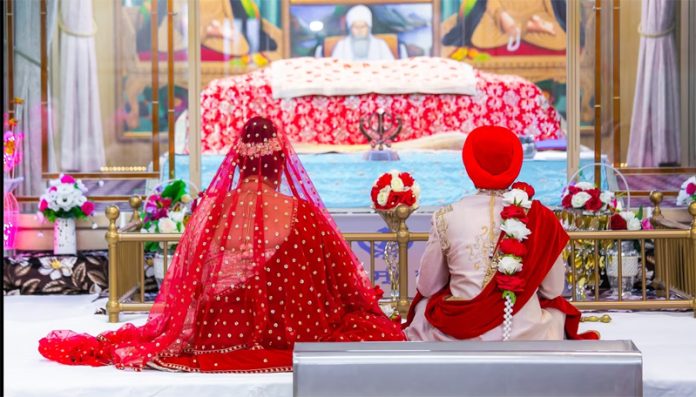Nishikant Khajuria
JAMMU, Dec 13: Fulfilling long pending demand of the Sikh community in Jammu and Kashmir, the Union Territory Administration has notified detailed rules for registration of marriages under Anand Marriage Act, which come into force with immediate effect.
Under the newly framed ‘Jammu and Kashmir Anand Marriage Registration Rules, 2023’, Tehsildars concerned shall be the Registrar of such marriages within their respective territorial jurisdiction.
According to a notification in this regard, issued by the Department of Law, Justice and Parliamentary Affairs, Sikh couples can apply for registration within a period of three months after solemnizing their marriage but face late fee if formalities are completed after the expiry of the deadline.
The implementation of the Anand Marriage Act has fulfilled long pending demand of the Sikh community in Jammu and Kashmir for statutory resignation to their marriage rituals. The Indian Parliament had passed the Anand Marriage (Amendment) Bill in 2012, bringing Sikh traditional marriages under the purview of legal recognition. While the Central Government approved the amendments, it was left for individual States and Union Territories to frame respective rules for the registration of Anand Marriages. Last year, the Supreme Court had issued notice on a plea seeking directions for the State Governments to formulate rules for the registration of Sikh marriages under the Anand Marriage Act, 1909.
As per the J&K Government notification, the bride and groom or their parents or relations shall present the memorandum for registration of marriage before the Registrar (concerned Tehsildar) within a period of three months from the date of such marriage.
The Registrar of Marriage, after scrutiny of documents and satisfying himself that the marriage has been duly solemnized, shall issue a certificate of Anand Marriage and provide two copies of the same within 15 days from the date of registration.
The memorandum for registration shall be accompanied with a fee of rupees one thousand and five hundred in the form of court fee stamps.
In case the parties to an Anand Marriage submit memorandum for registration of marriage after the expiry of three months but not after a period of six months from the date of solemnizing of the marriage, late fee of rupees two thousand in addition to the original fee shall be charged.
After the expiry of six months but within a period of one year from the marriage, the late fee will be rupees three thousand and the marriage shall be registered only after the written permission of the Deputy Commissioner concerned.
After an expiry of one year or above from the date of solemnizing marriage, the late fee shall be rupees five thousands and the marriage shall be registered only after obtaining written permission of the Secretary, Law, Justice and Parliamentary Affairs.
Any person aggrieved of an order passed by the Registrar, may file an appeal within a period of 30 days from the date of passing of such order.
If one of the parties to the marriage is non-resident Indian, in that case, they shall attach all necessary information along with the memorandum of marriage for registration.
The emergence of the Anand Marriage Act dates back to 1909 when the British Imperial Legislative Council passed a legislation for the recognition of the Sikh wedding ceremony Anand Karaj.


